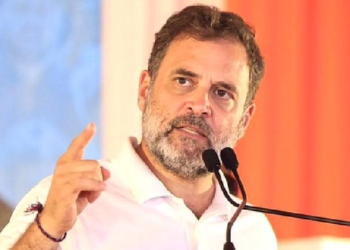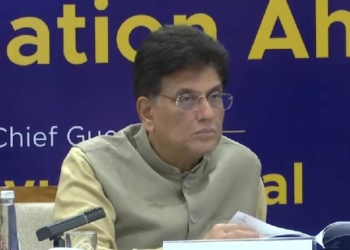Lucknow: Even as Ayodhya decks up to witness the historic Pran Pratishtha ceremony of the Ram temple on Monday, the holy town is also witnessing its emergence as an economic powerhouse.
Ayodhya had attracted a phenomenal investment commitment to the tune of Rs 49,000 crore at the 2023 Global Investor Summit in Uttar Pradesh held recently, heralding a new era of economic prosperity for the region.
According to government sources, in 2022-23, Ayodhya saw a 131 per cent surge in exports, at Rs 254 crore across diverse sectors, which is up from Rs 110 crore in the previous fiscal year.
Based on the data available from the Union Ministry of Commerce and Industry, the city is likely to continue on its upward trajectory and register a close to 150 per cent surge in exports during the current financial year.
Expressing satisfaction with Ayodhya’s impressive export numbers, Ayodhya Divisional Commissioner Gaurav Dayal emphasized that the economic success aligns seamlessly with comprehensive development. He acknowledged the district’s notable progress across nine distinct sectors, surpassing all previous export records.
Among export items, coal occupies a dominant position with the export of coal, including bituminous coal, valued at Rs 90.61 crore and steam coal at Rs 3.81 crore.
Various coal types contributed an additional Rs 44 crore to the export figures. Craft paper and paperboard exports reached Rs 44.56 crore, with poster paper making a noteworthy contribution of Rs 1.7 crore. The export landscape further featured Ayurvedic medicines (Rs 3.18 crore), parboiled rice (Rs 2.76 crore), wood pulp boards (Rs 3.12 crore), and bakery machinery (Rs 3.24 crore).
“The success story of Ayodhya reflects its commitment to economic diversification and sustained growth. The region’s unprecedented achievements underscore the potential for spiritual and economic coexistence, setting a benchmark for holistic development. This exceptional economic journey aligns with Ayodhya’s vision to be a model of sustainable development and prosperity. The district’s commitment to advancing economic sectors showcases its resilience and adaptability, resonating with the global investor community,” Dayal said.
Ayodhya is also set to emerge as UP’s first Solar City, marking a harmonious blend of spirituality and sustainable energy initiatives.
Spearheaded by the Uttar Pradesh New and Renewable Energy Department (UPNEDA), this ambitious project encompasses the development of solar parks, solar-powered boats, street lights, and the widespread adoption of solar energy in public transport.
The electrification of government buildings using solar power stands as a testament to Ayodhya’s commitment to a greener and more sustainable future.
With Prime Minister Narendra Modi and around 11,000 guests set to witness the ‘Pran Pratishtha’ consecration ceremony, Ayodhya’s transformation into a Solar City will become a national spectacle.
As a part of the Solar City program, Ayodhya is undergoing a remarkable transformation with a 40 MW solar power plant set to grace 165 acres of identified land. The ambitious project is well underway, with a 10 MW plant already commissioned and the full 40 MW capacity expected to be operational by March 2024.
As a part of the broader framework outlined in Uttar Pradesh’s Solar Energy Policy 2022, Ayodhya is set to pioneer solar innovation, serving as a model for 17 municipal corporations, including Noida.
The multifaceted plan involves strategically developing solar parks along the banks of the Saryu River and extends beyond infrastructure to include the adoption of solar energy in public transport, enhancing the city’s eco-friendly mobility.
Ayodhya’s solar initiative transcends mere technological deployment and encompasses public spaces, with the installation of solar-powered mobile phone charging setups, ensuring convenient access to clean energy.
The promotion of solar energy for domestic and household purposes signifies a comprehensive approach to integrate sustainable practices into the daily lives of Ayodhya’s residents.
The establishment of a 50-kilowatt off-grid solar power plant in the Bhairo Singh Gaushala, showcases Ayodhya’s dedication to harnessing solar energy across diverse sectors. Solar-powered water kiosks have been set up to ensure access to clean and sustainable water sources.
In the realm of rooftop solar power plants, a total capacity of 1073 kilowatt has been established on residential, commercial, and industrial buildings. This initiative, coupled with extensive outreach and 80 camps, aims to encourage widespread adoption of solar power and avail the benefits of the program.
Under the Babu Ji Kalyan Singh Gram Unnati Yojna for solar street lights, the target of 200 lights has been achieved, further enhancing rural infrastructure and ensuring well-lit public spaces.
These accomplishments collectively underscore Uttar Pradesh’s steadfast commitment to harnessing solar energy across various domains, fostering sustainable development, and championing environmental conservation.
(IANS)
















